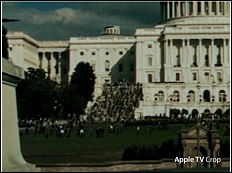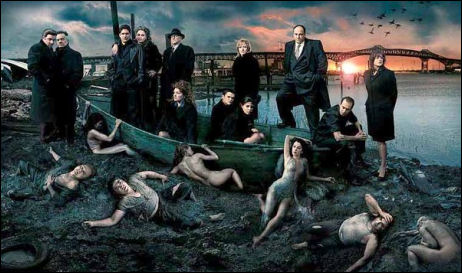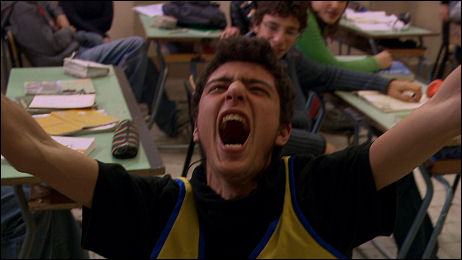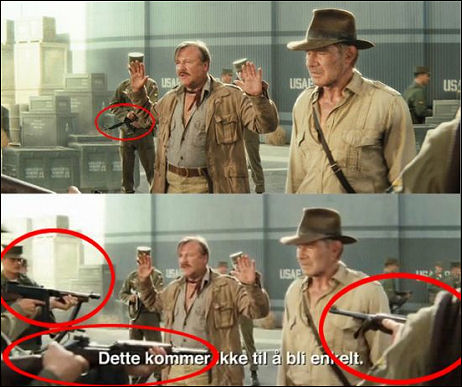All well and good that Paramount Vantage is apparently intending to distribute Philip Noyce‘s Mary, Queen of Scots, which will begin filming this spring, but…naaah, forget it. Each movie is its own novel, journey, river, song, etc. And plenty of time will have elapsed between this late ’09 release and The Other Boleyn Girl, which is out on 2.29.
Apple high-def vs. Blu-ray
Fortune‘s Philip Elmer-DeWitt offers a quality comparison between downloaded high-definition movies from Apple TV vs. Blu-ray DVD. Short verdict: Blu-ray is slightly better, but Apple isn’t far behind.


Apple TV image (l); Bluray image (r.)
Jamie Bell “Jumper” factor
Enough people are writing that Jamie Bell steals (or almost steals) Doug Liman‘s Jumper that I’m actually thinking about paying to see it this weekend from beginning to end instead of the previously mentioned catch-a-few-minutes’-worth plan. 20th Century Fox never invited me to see it at a screening. I might have gone if they had, but something more important (like taking a nap on the couch) might have come up.
The Lives of Loudmouths
Rule #5 in David Poland‘s Ten Rules of the Oscar Season (posted yesterday) states that “critics only matter when unanimous,” that they “can’t really kill or make an Oscar movie unless they are united in a clear, loud voice (even if that clear, loud voice is not a vast majority, just the right loudmouths).”
In other words, a sufficient number of loudmouths with a unified theory (this is right out of the handbook of Nikolai Lenin) can sway the industry masses? I don’t think he means that. All loudmouths can do is start a conversation, which the industry sometimes listens to and sometimes not, or picks up on or doesn’t pick up on. I recall at least two or three major-soapbox loudmouths beating the Dreamgirls drum pretty loudly in late ’06 and early ’07, but we know what happened there.
In any case, he says, “this year we saw what we haven’t seen since 2002, [which is] critics muscling a film into the Best Picture race.” Referring, of course, to There Will be Blood. Which, agreed, is an “honorable thing.”
But what other films have been strong-armed into Oscar contention circles by impassioned critical support, and which have been torpedoed and sunk by critical sneers? I could run a list but I’m wondering which films stand out in this regard in the minds of HE readers.
Like nothing since “The Sopranos”
Two weeks ago Boston Globe film critic Ty Burr delivered an NPR essay about how the “reality TV show with the craziest plot twists, the nuttiest characters and the biggest payoff is what he’s dubbed Primary Reality. It’s on at all hours, on almost every channel. And everyone else is watching, too. It also happens to be the race for the presidency of the United States.”

It dawned on me after listening to this yesterday that I’ve become absorbed in the presidential contest like nothing else since The Sopranos. There are no plot or character parallels (except for Hillary Clinton being a kind of Livia Soprano) but the campaign, like David Chase‘s long-running HBO series, is all about us. Recognizable values, identities, echoes, experiences. We all “know” who the political players are deep down (or think we do) and are caught up in guessing their fates and futures, and what forces are working for and against them.
All I know is that the campaign is providing major mainline highs on an almost daily basis, which makes it, in a very real sense, better than The Sopranos. The suspense is constant, there are no bad episodes, the plot turns are fast and furious. That’s why I’m writing about it a lot. It’s a first-rate drama with stirring characters. A stand-up hero, a scheming evil queen, a white-haired soldier with a take-it-or-leave-it attitude, a slick and squishy lawyer with a southern drawl, court jesters, Greek choruses, two-faced acolytes, knaves and fools, etc.
“The Substitute” Rules
I’ve finally seen all the Oscar-nominated live shorts (which are opening, by the way, on some 70 screens nationwide starting today), and my absolute favorite, hands down, is Andrea Judlin‘s The Substitute, a 15-minute Italian high-school comedy with a slight touch of Bunuelian surrealism.

Somehow a throughly unhinged businessman just waltzes into a high school classroom and pretends to be a substitute teacher. He’s a kind of Jerry Lewis– styled madman, a taunter, a mind-fucker and, oddly, a kind of divine interventionist.
He puts the students int their place, goofing on their atttitudes, making fun of them like a circus clown on drugs. He humiliates the class apple-polisher. He steals a valuable small ball from a fat kid (i.e., one that’s been signed by a soccer star) and won’t give it back. He’s a big-eyed nutter but not what I’d call harmful. Why he’s doing this is a mystery, and it doesn’t matter.
Then he asks a bespectacled bohemian-type girl to read a piece of private poetry she’s written to the class…and she refuses. The beauty of The Substitute is that this refusal, which happens around the ten-minute mark, kicks in at the very end in an identical but different context. It doesn’t precisely make sense, but at the same time it’s perfect. I’ve said it over and over — a great ending is worth its weight in gold.
The other nominated shorts are listed on this page. My second favorite short is At Night, a Danish-produced drama about a friendship between three young women who are marking time in a cancer ward. The other three — The Mozart of Pickpockets, Tanghi Argentina and The Tonto Woman — have their charms and intrigues, but none blew me away like The Substitute.
Ten Sexiest Docs
“Doc Soup” columnist Tom Roston, writing for the PBS/POV site, has a list of the Top 10 Sexiest Documentaries. Surely there are docs out there, seen or unseen, released or unreleased, that are sexier than these.
Noonan on Clinton, Part 2
The finest Hillary-trashing pot high of the day has already been provided, again, by the glorious Wall Street Journal columnist Peggy Noonan. It’s not just a hunger for a daily Hillary hate-on that articles like Noonan’s greatly satisfy, but an almost Biblical-level feeling of clarity, cleansing, righteousness. There’s no way to not feel good about this.
All last night I thought about the Clinton campaign’s communications director Howard Wolfson stating yesterday that, if necessary, Hillary is ready to burn the house down all spring and summer long in order to fulfill her clawing ambition. That first, the fair or decent thing second. But more and more people, thank God, seem to be understanding who she is.
“‘This is death by a thousand cuts,'” Noonan begins. “That’s what they keep saying about Hillary Clinton.
“Her whole life right now is a reverse Sally Field. She’s looking out at an audience of colleagues and saying, ‘You don’t like me, you really don’t like me!’
“Although of course she’s not saying it. Her response to what from the outside looks like catastrophe? A glassy-eyed insistence that all is well. ‘I’m tested, I’m ready, let’s make it happen!’ she yelled into a mic on a stage in Texas on the night of her latest defeat. This is meant to look like confidence. Whether or not you wish her well probably determines whether you see it as game face, stubbornness or evidence of mild derangement.
“In Virginia last Sunday, two days before the Little Tuesday voting, she suggested her problem is that she’s not a big phony. ‘People say to me all the time, ‘You’re so specific…why don’t you just come and, you know, really just give us one of those great rhetorical flourishes and then, you know, get everybody all whooped up?’
“I thought it an acknowledgement that loss might come,” Noonan writes. “But by Thursday afternoon, Mrs. Clinton was furiously stumping through Ohio using the same line of attack, but this time it wasn’t a marker. The race is about ‘speeches versus solutions.’ Her unnamed opponent stands for the first, she for the second. He is all ‘words,’ she is ‘action.’ ‘Words are cheap,’ she said.
“If they were so cheap, her inability to marshal them would not have cost her so dearly.”
Or as MSNBC’s Chris Matthews said yesterday, there’s never been a U.S. President commonly regarded as great who hasn’t been a great orator. What U.S. President who wasn’t a great orator and a profound uplifter of spirits is considered great by historians and the general public?
Noonan also underlines a relationship between Clinton’s way of doing things and that a certain departed U.S. president. She quotes “an old Richard Nixon hand” observing that “Nixon [didn’t] always think honesty is the best policy, but he [did] think it’s a policy.” Like Clinton, she implies, Nixon “saw it as a strategic gambit, to be used like any other.”
“Happening” trailer
The trailer that went up yesterday for M. Night Shyamalan‘s The Happening (20th Century Fox, 6.13), which looks and feels like a return to the eerie-scary-inexplicable jolt vibe of Signs. Perhaps this time we’ll be spared the religious hokum. (Thanks to HE reader Suki Jonze for the shout-out.)
“Indy 4” pants/guns/flag
At 4:31 this morning, AICN’s Drew McWeeny reported some digital tweakings in the U.S. version of the Indiana Jones and the Kingdom of the Crystal Skull teaser that are not evident on the international version. He was alerted to this stunning realization by a message board rant that appeared last night on CHUD.

A frame-filling American flag CU appears in the domestic version but is absent overseas. Fewer Russian guns are aimed at Harrison Ford and Ray Winstone in the U.S. version. And something about Winstone’s khaki pants is said to be strikingly different in the int’l vs. domestic versions. (Extra wrinkles? A urine spot? An absence of a belt?) Were the guns CG’ed out because of some MPAA edict? Is the American flag supposed to provide some kind of subminal emotional comfort to Bush-McCain nation?
I have to be honest and admit that on a scale of 1 to 10, my interest in this matter is currently between 4 and a 4.5.


